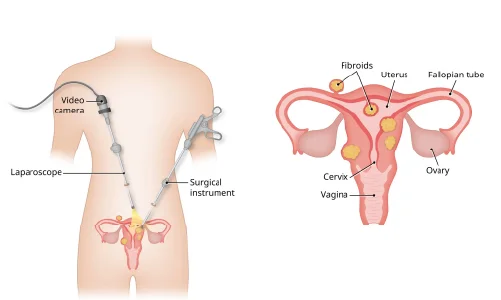Uterine fibroids, also known as myomas or leiomyomas, are non-cancerous growths in the uterus that can cause heavy menstrual bleeding, pelvic pain, and fertility issues. Myomectomy surgery is a procedure to remove these fibroids while preserving the uterus. For expert care and advanced treatment options, consult the top gynaecologists at CK Birla Hospital in Gurgaon.
Myomectomy is a widely used and highly effective surgical procedure which is performed to remove uterine fibroids. It is the preferred treatment for women who wish to retain their uterus and maintain fertility. Unlike hysterectomy, which involves the removal of the entire uterus, myomectomy focuses on excising only the fibroids, allowing for future pregnancies.

| Aspect | Minimally Invasive Surgery | Traditional Open Surgery |
| Incisions | Smaller incisions | Larger incisions |
| Recovery Time | Shorter recovery period | Longer recovery period |
| Pain and Scarring | Less pain and minimal scarring | More pain and noticeable scarring |
| Hospital Stay | Shorter hospital stay | Longer hospital stay |
| Infection Risk | Reduced risk of infection | Higher risk of infection |
Recovery time varies based on the type of surgery. Minimally invasive procedures like hysteroscopic and laparoscopic myomectomy typically require 1-2 weeks for initial recovery, while open surgery may take 4-6 weeks.
Yes, uterine fibroids can recur even after myomectomy. Long-term management and regular monitoring are necessary to reduce the risk of recurrence.
Yes, non-surgical treatments include medication, hormone therapy, and uterine artery embolization. These treatments can manage symptoms and reduce fibroid size but may not eliminate fibroids entirely.
Most health insurance plans cover myomectomy surgery. It is important to check with your insurance provider for specific coverage details and any potential out-of-pocket costs.
Signs include sudden, severe pelvic pain, fever, heavy bleeding, and increased urinary frequency. Seek immediate medical attention if you experience these symptoms.
Yes, uterine fibroids can affect fertility and pregnancy. They can interfere with conception, increase the risk of miscarriage, and cause complications during labour. Myomectomy can improve fertility outcomes.
For expert diagnosis and treatment of uterine fibroids, including myomectomy surgery, trust the experienced gynaecologists at CK Birla Hospital in Gurgaon. Contact us to schedule a consultation and explore your treatment options.